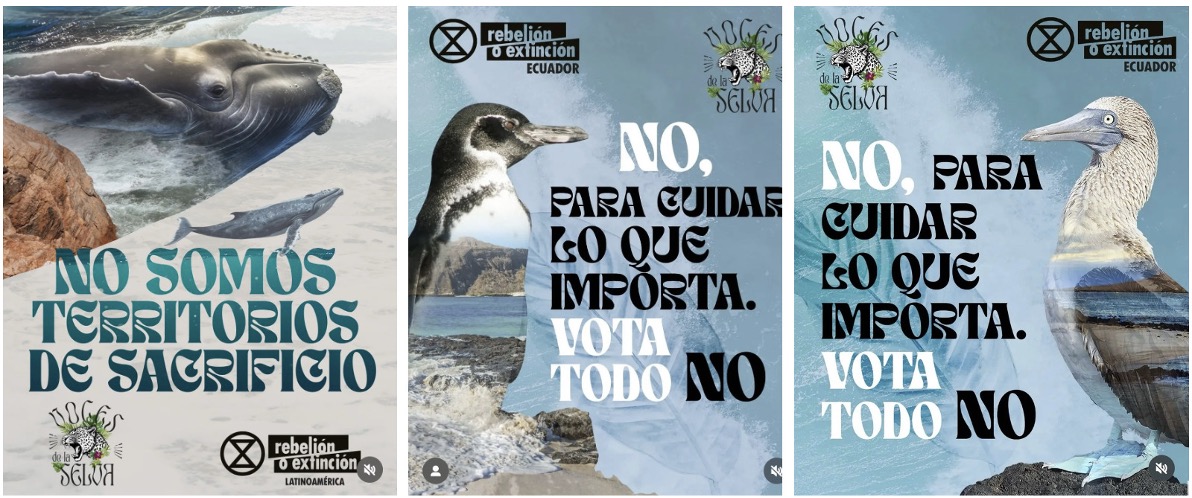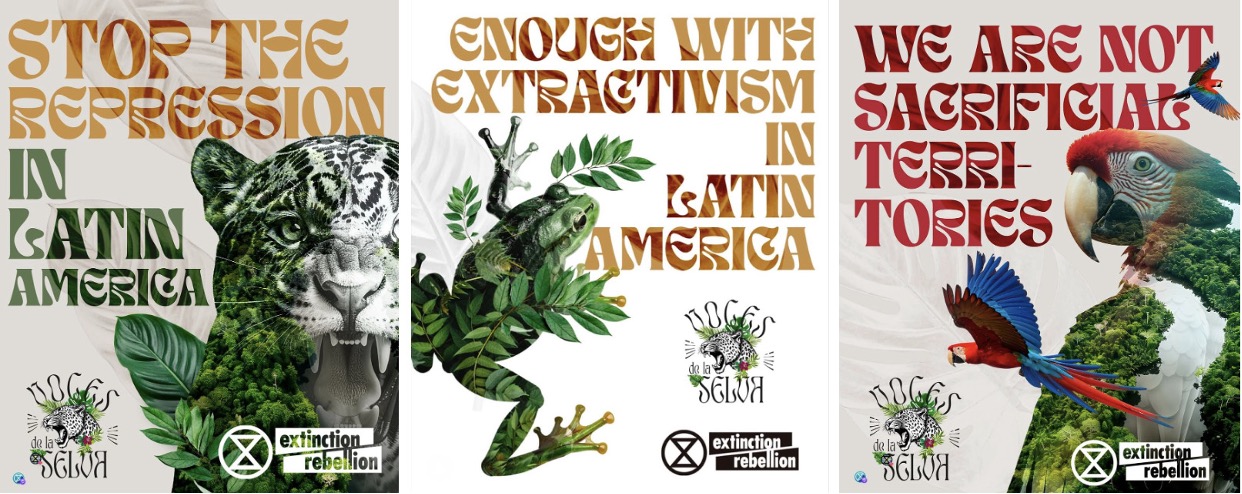Photo: XR latinoamerica
Dear rebel,
Despite centuries of political revolution, it seems those in power still have a misunderstanding. Even though you probably don’t identify with terms like feudalism or the divine right of kings, billionaires, politicians, and big business still seem to. Every action they take proclaims that they believe our lives and lands exist only for their profit. Across the world, they exploit our resources without concern for their impacts on the majority of human beings or, indeed, other living things.
In this month’s newsletter, XR is here to tell you that we will not live their dream. We are a movement made up of members of the general public, and we have our own dreams. Our dreams do not end at the cessation of fossil fuels. Rather, they begin there. Because only a world that is not exploited, polluted, and threatened by the few can foster our real desires: to live happy, healthy lives. The specifics of our ambitions vary as widely as any population of citizens. But around the world, XR members are putting their own dreams on hold to fight for that better world. In Ecuador, they are reminding world leaders that theirs is not sacrificial land. In South Africa, they are standing up against the operation of yet more coal mines. And in Germany, rebels are demonstrating the horrors of corrupt financial institutions.
We know that you, like us, have dreams. Maybe you want to cure rare diseases, or maybe you just want to raise your children. But no matter your goals, they will remain vulnerable as long as the few with power and money believe theirs are the only dreams that matter. So please take a moment to draw inspiration from XR groups around the world. And then, in whatever way you are able, we hope you will help us fight for the universal dream of a better world.
This newsletter is brought to you by XR Global Support, a worldwide network of rebels who help our movement grow and need money to continue this crucial work.
[BEST HOLIDAY GIFT EVER: A LIVEABLE PLANET]Action Highlight
No somos territorios de sacrificio

Photo: xrcuenca
November 2025 | Ecuador
This month, XR rebels in Ecuador are fighting to protect a national natural treasure. The Galapágos Islands, a world-famous national park and marine reserve, are threatened by the proposal to put a US military base on Baltra Island. Despite the rare biodiversity of the archipelago, home to over 150 endangered animal and plant species, Ecuadorian President Daniel Noboa and US President Donald Trump have been discussing the scheme since December 2024. The final decision whether to allow foreign military bases in the country will come to a head in a national referendum on 16th November.
Rebels in Ecuador have campaigned online and on the streets, their action focusing on urging citizens to vote against the military base. Quito rebels displayed banners in the Carapungo neighbourhood and handed out potted plants to passersby adorned with a vote no motif, a thoughtful reminder of the human appreciation of nature when it sits before us, yet frequent neglect of our duty to protect it. Online, an impactful media campaign depicts the animals native to the Galapágos, whose home is left at risk by these military developments. The species portrayed, such as the Galapágos penguin, Galapágos sea-lion, and marine iguana, live predominantly or exclusively on the archipelago.

Photos: xrcuenca
To threaten the sanctity of the Galapágos is to threaten thousands of species which have lived for millions of years on the islands in geographic isolation. It is an attack on a unique pocket of biodiversity, rare in a world dominated by the atrocities of human development. During the Second World War, the operation of a previous US military base on Baltra Island led to the near-disappearance of the endangered yellow iguana population.
Moreover, the Ecuadorian population feels lied to. The proposition is a direct violation of the Ecuadorian constitution, which promises respect and protection of the Pacha Mama and natural spaces of the nation. What will our world become if nature reserves continue to be violated in this way? A military base on the Galapagos archipelago, skyscrapers surrounding the last pines of Yellowstone, an oil rig looming above the Great Barrier Reef? This issue strikes at the very heart of what our organisation stands for and the phenomenon from which we take our name: without rebellion, extinction is inevitable. Follow xrecuador and xrcuenca and xrlatinoamerica.

Photos: xrlatinoamerica
Action Roundup
XR Vaal stands against new coal mines

Photos: XR Vaal
October 2025 | Gauteng, South Africa
XR Vaal (Gauteng, South Africa) carried out a non violent direct action outside the Department of Minerals, Resource, and Energy (DMRE) Regional Office at Braamfontein, Johannesburg. They were demanding clarity on the ‘prior public consent’ in the Environmental Authorisations for the coal mines issued by the Department.
Gauteng is the smallest province in South Africa but has the largest population and is home to Johannesburg, the biggest city in South Africa. Residents of the Vaal area and XR rebels have been protesting open pit coal mines near their communities for years.
Last month, XR Vaal emphasized that the company proposing the new mines, Glubay Coal, is a subsidiary of Canyon Coal which is continuing to ship coal to Israel, despite South Africa’s strong public stance against the war in Gaza and the genocide case it brought against Israel.
For more about XR Rebel Actions around the world, follow @extinctionrebellion
The real horror is the banks

Photo: XR Hamburg
1 November 2025 | Hamburg, Germany
In a bold and spooky Halloween protest, German rebels took to Hamburg’s city centre to confront Deutsche Bank over its devastating role in the fossil fuel industry. Dressed as terrifying characters in a chilling nod to the holiday, rebels demanded an immediate end to all oil, gas, and coal investments. This non-violent action, part of a Germany-wide wave of demonstrations, aimed to expose the ‘creepy’ and destructive practices of the country’s largest financial institution.
Between 2016 and 2023, Deutsche Bank funneled $60 billion into the fossil fuel industry, making it the sixth-largest bank in Europe financing fossil fuels. Philipp Noack, Finance Campaigner at Urgewald, emphasised the bank’s failures: ‘Deutsche Bank, in particular, is failing to transform its business model. Instead of promoting sustainable energies, it has actually cut back on financing them while simultaneously increasing its support for risky fossil fuels’.
Across the Atlantic, last month, rebels in Boston staged a similar demonstration targeting major U.S. banks that finance fossil fuels – you can read all about it in October’s newsletter. Follow Extinction Rebellion Hamburg here. From Hamburg to Boston, climate activists are sending a clear message**: financial institutions can no longer hide from their role in driving the climate crisis.**
Positive News
Investment in renewables is surging, making the transition ‘inevitable’
Investment in clean energy sources and storage is accelerating, helping save vast sums of money and bolstering economic resilience worldwide. And this supply boom will ‘seal the transition’ away from fossil fuels according to the annual report from the International Energy Agency (IEA).
A new study, also by the IEA, found that since 2010, over 100 countries have reduced their reliance on importing coal and gas for electricity generation – some by a third, and even up to half, in the case of Denmark.
Despite opposition from right-wing political figures in the US and elsewhere, investment in renewables hit a record high in the first half of 2025. Europe is seeing particularly significant increases as developers redirect offshore wind projects from the US.
Must Reads
Plug-in hybrid cars are almost as bad for the environment as petrol cars
A study by Transport & Environment (T&E), found that plug-in hybrid vehicles -PHEVs- (long promoted as a cleaner alternative) emit nearly as much CO₂ as petrol cars in real-world driving. An analysis of 800,000 European hybrids showed emissions nearly five times higher than lab tests claimed, delivering a mere 19% reduction compared to petrol or diesel vehicles. Even when driven in electric mode, PHEVs emit _68 gCO₂/km_because their electric motors lack sufficient power, forcing the combustion engine to supply energy for almost one-third of the distance. This hidden fuel use disproves the perception of electric savings. The report warns that PHEVs are risky, not a long-term solution, and stresses the need to enforce utility factor corrections. Read more here | Read the study here
New research proves carbon offsets are an illusion of climate action
A major new review has delivered a damning verdict on the global carbon-offset system, finding that after 25 years it has largely failed to reduce greenhouse gas emissions in any meaningful way. The analysis exposes deep, systemic flaws from non-additionality (where credits are issued for projects that would have happened anyway), to impermanence, (as forests burn or are later cleared), to leakage (where emissions simply shift elsewhere). It also highlights double-counting and weak oversight that have allowed companies and governments to exaggerate their climate progress.
The researchers warn that this broken system has become a dangerous illusion and a way for polluters to buy the appearance of action while continuing business as usual. Researchers are now calling for a bold shift away from unreliable offsets toward genuine solutions: permanent carbon removal, tougher regulation, and above all, rapid, direct cuts to emissions. Read more here | Read the research
Forest Declaration Assessment reveals a forest paradox
A spike in the regrowth of new trees may sound like good news, but in reality is part of a larger, bleaker truth. This article from Mongabay frames forest regrowth for what it truthfully is: merely a natural follow-on from excessive destruction by humans, rather than the result of any government-led initiative to slow or heal from deforestation. More new trees are growing in spaces cleared by logging, simply because those cleared spaces are increasing exponentially in number. And those new saplings are far from replacing the value of the most ancient and biodiverse forests which are disappearing the fastest.
We are currently seeing very little applaudable action from nations, and international environmental conferences seem to disintegrate into empty promises and ultimately, missed targets. We must not be misled by the idea that forests around us are healing, as they are not healing faster than we are destroying them.
Quick Watch
The great news is that solar and wind power have been expanding rapidly. The bad news is that expansion has created a backlash of disinformation. Carbon Brief has done an excellent summary of common falsehoodsand this 2 minute video is a quick and very clear explanation about how much land is needed for the U.S. to run on 100% renewables. Spoiler alert: less than is currently used for fossil fuels and biofuels.
Busting a myth on how much land is needed for the U.S. to run on 100% renewables vs fossil+biofuels
Book Review

The Conceivable Future by Meghan Elizabeth Kallman and Josephine Ferorell
In their book, The Conceivable Future, authors Meghan Elizabeth Kallman and Josephine Ferorelli skillfully unpack impossible questions like “should I have children when we are living in a climate crisis?” The authors began by exploring the nexus of family and climate change by hosting house parties where community members connected and discussed the sensitive and nuanced topics of family planning and taking action in the age of climate change. The conversations and concerns shared at those events evolved into the book.
This book is exceptionally well researched. Kallman and Ferorelli present a compelling argument about why babies are not bad for the planet and why reproduction should not be seen as an emissions reduction tool. First, affluence, not population, is the primary driver of greenhouse gas emissions. Second, in detailing the long, shameful history of reproductive injustice in the United States and globally, the authors make clear that controlling, or encouraging the control of, the reproduction of (child-bearing) bodies is never acceptable.
Our reviewer wrote: “I do not have children, and I do not have strong climate-related concerns around whether or not to have children. But I have known people who do not want to have children for climate-related reasons. Before I picked it up, I expected that this book would be helpful for learning more about this topic in general, but I also suspected that I might not connect with the book because I do not have or want children. But I did connect with this book. It was engaging and informative, and I am glad I read it.”
Avoid Amazon. Support local bookshops in person when you can. Online buy your books at Bookshop or Hive (UK).
Ancestors of XR

The Luddites
There’s a very old word that seems to be on everyone’s lips again, from increasing numbers of proud dumbphone owners to events like the recent ‘NYC Luddite Tribunal’ and Columbia University’s conference entitled ‘New Luddism’. Why is the term Luddite back in circulation?
Two centuries ago, the Industrial Revolution brought in new mechanical innovations that would transform the nature of work and entirely reshape Western societies. Craftspeople saw their traditional skills supplanted by industrial-scale machinery that speeded up production, maximizing efficiency and profit for the factory owners. These once-independent artisans – used to owning their own tools and setting prices for what they made – were now herded into big factories where their hours, pace, and output were tightly controlled. A loosely organized resistance movement of textile workers sprang up in northern England, known as the Luddites. These bands of skilled weavers, knitters, and artisans could see that the new system wasn’t in their best interests; it would strip them of any control, concentrating ownership in a few hands and reducing workers to replaceable cogs that could be manipulated and discarded at will.
The Luddites are famous for rioting and smashing the mill owners’ new mechanized looms they feared would steal their livelihoods. But it wasn’t the technology itself they were against – it was the fact that it eroded their autonomy and the social cohesion of their communities*.* The British government suppressed these uprisings with brutal military force, shooting rioters and sentencing them to be hanged or transported to penal colonies in Australia. Although the Luddites were ultimately crushed, their name endures as a symbol of resistance to unregulated technological change. Like today’s rebels, they opposed a model of progress that prioritizes profit and productivity over human and ecological wellbeing.
The AI boom has been a powerful enabler of corporate automation and cost-cutting algorithms. With Big Tech fundamentally transforming modern life in the Fourth Industrial Revolution, the Luddites remind us of the moral dimension behind technological progress: a small elite are enriched, while countless others are left deskilled and economically powerless in a society that’s lost its humanity. Being a Luddite today isn’t about smashing machines, but helping smash oppressive systems – and more and more of us are proudly reclaiming the Luddite mantle.

Photo: Working Class Movement Library catalogue, in public domain, via Wikimedia Commons
Worth a Second Look

The Fallout From Faraway Fires: Nine Alarming Facts About Wildfire Smoke
Heed this warning; you may choose to live in blissful ignorance of our burning world until wildfire smoke from thousands of miles away fills your lungs on your morning commute. Through nine haunting facts about the widespread effects of wildfire smoke and its pollutants, this blog post portrays the sheer scale of the damage caused by our increasingly longer and drier summers, from the flames of the forests to the smog-blanketed cities. As more medical consequences of pollutants from wildfire smoke are discovered, we are reminded that our health and the health of the earth are intrinsically linked. Immediate action is the only way to ensure the safety of future generations.
Extinction Rebellion Global Support 2024 Financial Report
Accountability and transparency matter. XR depends on its supporters and we’d like to share with you how your donations were used last year. Check out the XR Global 2024 Financial Report here.
From our Readers
We’d like to hear from you! Please email us at: xr-newsletter@protonmail.com
Forward this newsletter to a friend. If this was forwarded to you, join us and subscribe to the XR Global Newsletter. If you have any questions or feedback, we want to hear from you. Get in touch at xr-newsletter@protonmail.com
P.S. Looking for a sustainable holiday gift? Make a donation to help power the rebellion!
Great Job Extinction Rebellion & the Team @ Ecological & Climate Change News | Extinction Rebellion Source link for sharing this story.




